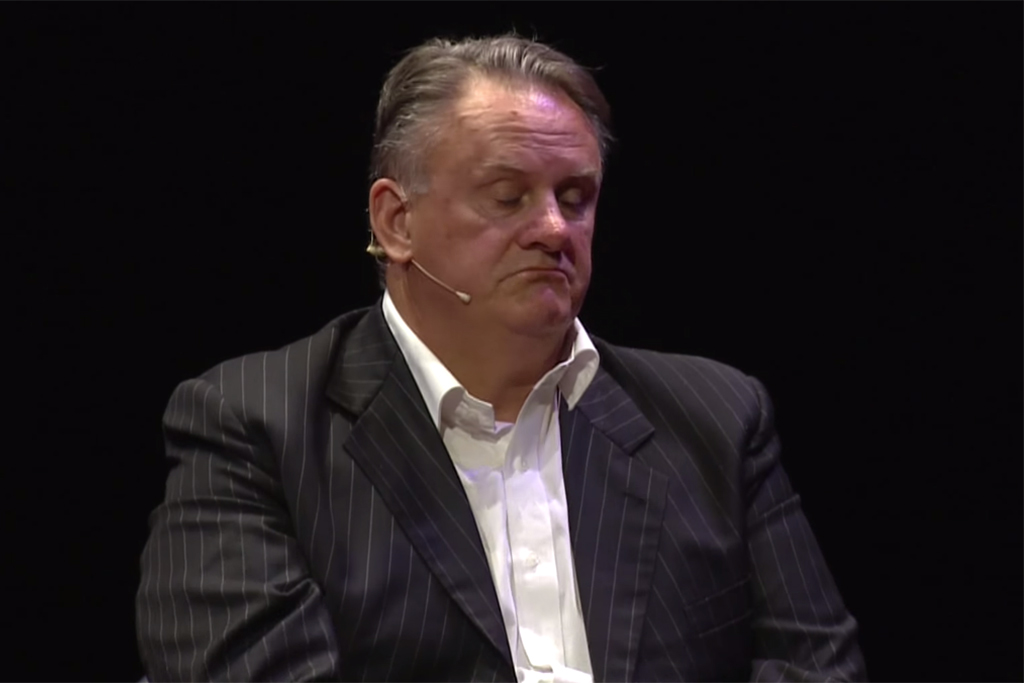Mark Latham Thinks People Should Stop Whinging About Depression And Anxiety Because ‘Birdman’
The unexpected virtue of ignorance.

First of all: I moved to Australia from New Zealand in late-2005, so my knowledge of Mark Latham is somewhat stilted. People assure me that before this time he was in fact a regular human capable of compassion, reason and logic, but in my time here I haven’t seen him offer the Australian public any more than ridiculous insensitivity and assorted old-fartedness. A few years ago I served his family at a pub and he gave me a $20 tip, but that’s about the extent of it.
Now, his column in today’s Australian Financial Review confirms my worst suspicions. I’m glad your kids enjoyed their raspberry lemonades, Mark, but $20 isn’t enough to redeem you from this one.
Mark Latham's views on depression and anxiety are exactly what you'd think they'd be. pic.twitter.com/VAiHBkUh0o
— Denham Sadler (@denhamsadler) March 7, 2015
In this, an incredibly timely column about a film which was released two months ago, Latham makes the argument that “Hollywood’s trendy-Left arts community” which produced Birdman are bringing up the issue of mental illness because it is “in vogue”.
He does this by using the first few sentences to criticise Inception for its unrealistic depictions of architecture, going on to describe the contours of his wife’s face as she sleeps in movie theatres, and then blindsiding everyone with a smackdown of Australia’s perceptions of mental illness.
Following? No? Oh well. Just like your life-long struggle with anxiety, Latham does not care.
“Even though only 2 percent of Australians suffer from clinical depression, 10 per cent of the population is on anti-depression drugs. The other 8 percent are said to be suffering from anxiety: feeling moody and worrying about things. Anxiety used to be seen as a regular part of life — worrying about your children’s welfare, worrying about driving in the wet, worrying you footy team is behind at half-time — but now it’s become a frontline health condition; the medicalisation of normality.”
It’s a familiar albeit unfeeling argument; one which seems to be consistently made by people who have in fact never suffered from depression or anxiety.
Mark Latham on depression (apparently he doesn't have it so nor do you) pic.twitter.com/yiC48km0et via @marygarden
— Mark Colvin (@Colvinius) March 7, 2015
But, with his specific and harsh criticisms of “the predatory instincts of Jeff Kennett’s beyondblue empire”, the tokenistic and obscure quote from Karl Marx’s mother, and hamfisted critique of the cinematography of a film which was awarded Best Picture at the Academy Awards, Latham’s contributions feel somewhat unique.
“Even though a high proportion of people are leading lives of comfort, the political class wants us to believe we’re a bunch of head-cases … In popping truckloads of pills themselves, they want the rest of us to do the same: a nation of Birdmen, on and off the screen.”

Former Victorian Premier and President of beyondblue Jeff Kennett was among the many to respond negatively to the article posting the following epic five-part statement on Twitter this afternoon.
.@marygarden @illywhacker_ We live in a free society where free speech is a cornerstone of our democracy. Mark Latham is entitled to his 2/4
— Jeff Kennett (@jeff_kennett) March 7, 2015
2/4 views. But I could not disagree with him more. Depression is an illness that can be cured, or serious depressive/ mental illnesses 3/4
— Jeff Kennett (@jeff_kennett) March 7, 2015
3/4 managed, lives improved if we better understand the illness, and reduce community discrimination against depression. 7 people a day 4/4
— Jeff Kennett (@jeff_kennett) March 7, 2015
4/4suicide, beyondblues work have saved many. Easy to criticise Mark but what are you doing to assist any public endeavour? Maybe your 5/4
— Jeff Kennett (@jeff_kennett) March 7, 2015
5/4 of tolerance, your lack of sympathy, your short fuse were contributing factors why the Aust public assessed you to be unfit to lead Aus
— Jeff Kennett (@jeff_kennett) March 7, 2015
And this isn’t even the first time Latham’s been criticised for insensitivity towards those suffering from mental illness. In his most infamous column for AFR last November he wrote about a mother taking anti-depressants as if it were the equivalent of a mother shooting heroin into her infant child’s eyeballs.
Anna Spargo-Ryan wrote a beautiful response to this in Women’s Agenda, speaking about her personal experiences with post-natal depression. “In contributing to stigma surrounding mental illness, [Latham is] endangering these women, the ones who are on the cusp, who haven’t started a conversation yet,” she said. “[He’s] endangering their families.”
And in a way, this is obvious.
I could also add to the chorus of people attesting to the fact that Latham is wrong. I could tell him about the times I’ve had panic attacks that have left me hyperventilating and uncontrollably crying in airport terminals or the fact that I can suffer from generalised anxiety disorder without being clinically depressed. It would probably confuse him to know that in this, my specific and comparatively mild experiences with anxiety, I’ve used medication as an occasional tool in conquering these problems; I do not nor have I ever self-identified as Birdman.
But, what’s the point?
If you are one of the AFR editors who published this column because it was “provocative”: yes, you should probably know there are people out there writing better things about both mental illness and film (separately). Please choose to publish them instead.
For everyone else: let’s just let Mark Latham drift quietly into the obscurity in which he so desperately belongs.
tl;dr Mark Latham: "how birdman is a metaphor for myself because we're both terrible and make no sense"
— Helen Davidson (@heldavidson) March 7, 2015
–
If you would like to talk about mental illness, you can reach Lifeline 24 hours a day on 13 11 14.